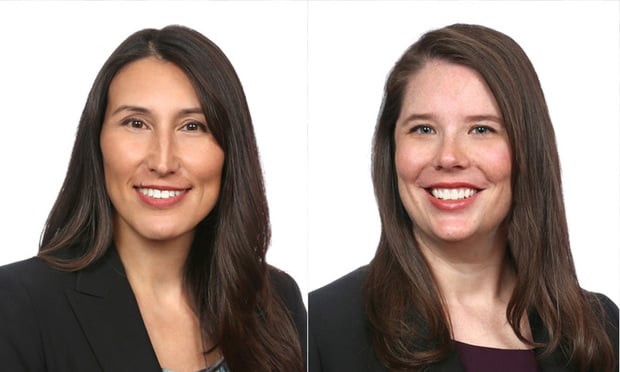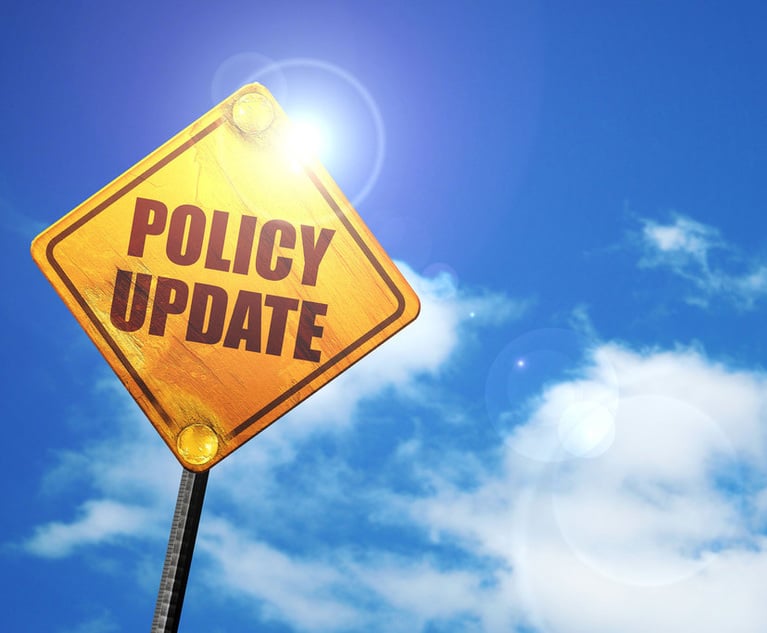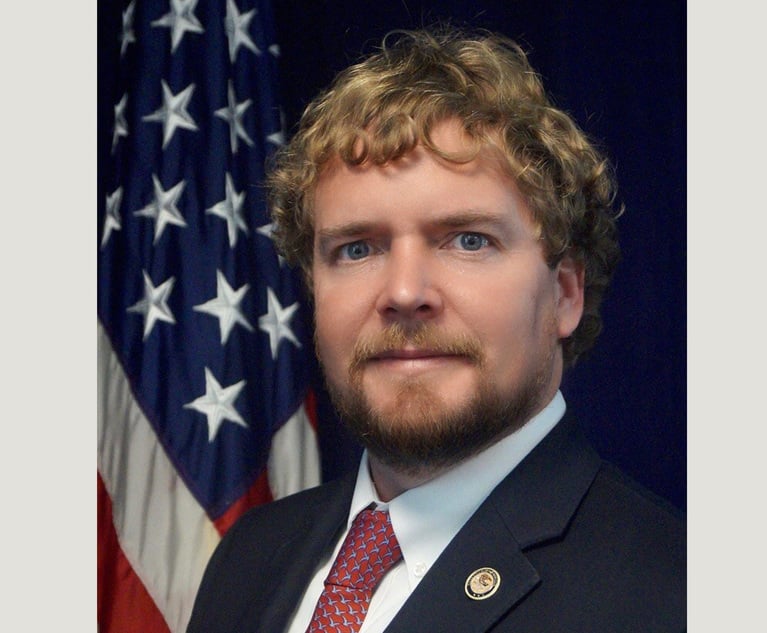Will COVID-19 Lead to Claims Against Lawyers?
The years following the 2008/2009 financial crisis led to a large uptick in claims against attorneys, and attorneys should be aware similar situations could occur in the COVID-19 crisis. Clients who lose money, opportunities, or deals may look to blame others to recover their losses, even where no fault actually lies with their attorney. For example, clients in real estate transactions and other financial services brought a number of claims in the years after the 2008 crash against lawyers, realtors, and financial institutions. Clients in the COVID-19 environment may similarly take the position that their attorneys were "guarantors" of specific outcomes for their clients, even though the law does not hold lawyers to such a standard.
April 06, 2020 at 11:20 AM
6 minute read
 Shari Klevens (left) and Alanna Clair, Dentons. (Courtesy photo)
Shari Klevens (left) and Alanna Clair, Dentons. (Courtesy photo)
As the shutdowns relating to COVID-19 continue, attorneys have begun to adjust to the "new normal" of working and supporting clients remotely. Attorneys whose home office spaces were largely decorative are now finding themselves trying to conduct business while other members of the family also face disruptions to their daily lives. Luckily, advancements in technology make remote working easier than ever before through laptops, videoconferences and electronic files.
But this time of working remotely can be uniquely challenging for attorneys. Here are some questions we have received about the challenges posed by COVID-19, social distancing orders, and the aftermath.
Could the Pandemic Lead to More Attorney Malpractice Claims?
News reports have suggested the aftermath of the pandemic may have an impact on the global economy, as some businesses have reduced their output or ceased work altogether. An economic crisis also can result in a reduced volume of business for attorneys, if their particular client community reduces its legal spend. (Notably, for other attorneys, business may actually increase as legal advice is needed by clients in new areas related to COVID-19, changed supply chains nd governmental orders and regulations.) However, trouble in the economy can foretell an increase in claims against professionals. Notably, the years following the 2008/2009 financial crisis led to a large uptick in claims against attorneys.
Clients who lose money, opportunities or deals may look to blame others to recover their losses, even where no fault actually lies with their attorney. For example, clients in real estate transactions and other financial services brought a number of claims in the years after the 2008 crash against lawyers, real estate agents and financial institutions. Clients in the COVID-19 environment may similarly take the position that their attorneys were "guarantors" of specific outcomes for their clients, even though the law does not hold lawyers to such a standard.
Thus, it can be helpful for attorneys to document the instructions they receive from clients and the work that the attorneys are doing to support clients during this unusual time. While such documentation may not be required under the client engagement terms or the Rules of Professional Conduct, maintaining such documentation later may help in reminding a client of the agreed parameters of the legal work or in defending a legal malpractice claim. It is also important to remember that receiving a claim for legal malpractice does not mean the attorney has actually committed legal malpractice.
Another consequence of financial pressures on attorneys and practices is that attorneys may look for ways to stay busy if their work has slowed down. However, attorneys who "dabble" in specialized areas of the law in which they lack experience or knowledge can create risks for themselves.
Indeed, Rule 1.1 of the Georgia Rules of Professional Conduct warns attorneys not to take on a matter "which the lawyers knows or should know to be beyond the lawyer's level of competence without associating another lawyer who the original lawyer reasonably believes to be competent to handle the matter in question." There are many factors that bear on "competence," as detailed in the comments to Rule 1.1, including the attorney's experience, study of the area of law, preparation, and association with other lawyers. An attorney who seeks to increase revenue by "dabbling" in other types of legal matters without the appropriate preparation or support can lead to mistakes, misunderstandings of the law, and ultimately, and increased risk of client claims.
What Are the Risks for Active Cases?
For many attorneys, there is a great deal of practical uncertainty regarding ongoing representations and deadlines. Some courts have closed entirely; others have closed for non-emergency business but are continuing to manage other cases; still others have modified the filing or docketing rules. It can be risky to simply assume in an active matter that deadlines and obligations have been stayed without the appropriate support.
If there are deadlines in a matter or under a statute or regulation, those could still apply, absent an agreement with opposing counsel and/or an order from the court postponing or modifying those deadlines, or orders from federal or state authorities relieving the requirements. Further, in certain situations, attorneys can review with clients whether the current business environment warrants moving some cases forward or whether it is in the client's interest to defer decisions or activity.
There also can be risks stemming from the potential distractions to attorneys posed by the ongoing news cycle, a sick relative, the new challenges of remote working, the closures of schools and day care centers and the client's own challenges in this situation. First, it is helpful for all of us to have compassion for the changes to daily life that everyone is experiencing. Second, attorneys can take steps to "return to basics" of good practice management, such as ensuring that docketing, calendar management and professional support resources are in place to provide competent legal services to the client and help reduce risk.
How Can Attorneys Protect Their Mental Health?
Part of social distancing means that those who rely on social interactions to alleviate depression or maintain sobriety may be affected. Many organizations dedicated to well-being have begun having meetings online or posting other resources for people to use from home. Georgia's Lawyer Assistance Program, a leader in the field, has a confidential hotline staffed by trained counselors 24 hours a day to discuss depression, stress, alcohol/drug abuse, or other mental health struggles of Georgia lawyers. The LAP telephone hotline is available at 800-327-9631.
Stressful conditions or social isolation can compound negative feelings. Attorneys should seek or accept help as needed. It also can be helpful to check on others to see how they are coping and to provide support. Consider more frequent telephone calls with colleagues, or conduct wellness calls or video chats to help people feel connected and combat loneliness or other negative feelings.
Shari L. Klevens is a partner at Dentons in Atlanta and Washington, D.C., and serves on the firm's U.S. board of directors. She represents and advises lawyers and insurers on complex claims and is co-chair of Dentons' global insurance sector team.
Alanna Clair, also a partner at the firm in Washington, focuses on professional liability and insurance defense. Klevens and Clair are co-authors of "The Lawyer's Handbook: Ethics Compliance and Claim Avoidance" and the 2020 edition of "Georgia Legal Malpractice Law."
This content has been archived. It is available through our partners, LexisNexis® and Bloomberg Law.
To view this content, please continue to their sites.
Not a Lexis Subscriber?
Subscribe Now
Not a Bloomberg Law Subscriber?
Subscribe Now
NOT FOR REPRINT
© 2025 ALM Global, LLC, All Rights Reserved. Request academic re-use from www.copyright.com. All other uses, submit a request to [email protected]. For more information visit Asset & Logo Licensing.
You Might Like
View All


Law Firms Mentioned
Trending Stories
- 1SurePoint Acquires Legal Practice Management Company ZenCase
- 2Day Pitney Announces Partner Elevations
- 3The New Rules of AI: Part 2—Designing and Implementing Governance Programs
- 4Plaintiffs Attorneys Awarded $113K on $1 Judgment in Noise Ordinance Dispute
- 5As Litigation Finance Industry Matures, Links With Insurance Tighten
Who Got The Work
J. Brugh Lower of Gibbons has entered an appearance for industrial equipment supplier Devco Corporation in a pending trademark infringement lawsuit. The suit, accusing the defendant of selling knock-off Graco products, was filed Dec. 18 in New Jersey District Court by Rivkin Radler on behalf of Graco Inc. and Graco Minnesota. The case, assigned to U.S. District Judge Zahid N. Quraishi, is 3:24-cv-11294, Graco Inc. et al v. Devco Corporation.
Who Got The Work
Rebecca Maller-Stein and Kent A. Yalowitz of Arnold & Porter Kaye Scholer have entered their appearances for Hanaco Venture Capital and its executives, Lior Prosor and David Frankel, in a pending securities lawsuit. The action, filed on Dec. 24 in New York Southern District Court by Zell, Aron & Co. on behalf of Goldeneye Advisors, accuses the defendants of negligently and fraudulently managing the plaintiff's $1 million investment. The case, assigned to U.S. District Judge Vernon S. Broderick, is 1:24-cv-09918, Goldeneye Advisors, LLC v. Hanaco Venture Capital, Ltd. et al.
Who Got The Work
Attorneys from A&O Shearman has stepped in as defense counsel for Toronto-Dominion Bank and other defendants in a pending securities class action. The suit, filed Dec. 11 in New York Southern District Court by Bleichmar Fonti & Auld, accuses the defendants of concealing the bank's 'pervasive' deficiencies in regards to its compliance with the Bank Secrecy Act and the quality of its anti-money laundering controls. The case, assigned to U.S. District Judge Arun Subramanian, is 1:24-cv-09445, Gonzalez v. The Toronto-Dominion Bank et al.
Who Got The Work
Crown Castle International, a Pennsylvania company providing shared communications infrastructure, has turned to Luke D. Wolf of Gordon Rees Scully Mansukhani to fend off a pending breach-of-contract lawsuit. The court action, filed Nov. 25 in Michigan Eastern District Court by Hooper Hathaway PC on behalf of The Town Residences LLC, accuses Crown Castle of failing to transfer approximately $30,000 in utility payments from T-Mobile in breach of a roof-top lease and assignment agreement. The case, assigned to U.S. District Judge Susan K. Declercq, is 2:24-cv-13131, The Town Residences LLC v. T-Mobile US, Inc. et al.
Who Got The Work
Wilfred P. Coronato and Daniel M. Schwartz of McCarter & English have stepped in as defense counsel to Electrolux Home Products Inc. in a pending product liability lawsuit. The court action, filed Nov. 26 in New York Eastern District Court by Poulos Lopiccolo PC and Nagel Rice LLP on behalf of David Stern, alleges that the defendant's refrigerators’ drawers and shelving repeatedly break and fall apart within months after purchase. The case, assigned to U.S. District Judge Joan M. Azrack, is 2:24-cv-08204, Stern v. Electrolux Home Products, Inc.
Featured Firms
Law Offices of Gary Martin Hays & Associates, P.C.
(470) 294-1674
Law Offices of Mark E. Salomone
(857) 444-6468
Smith & Hassler
(713) 739-1250







